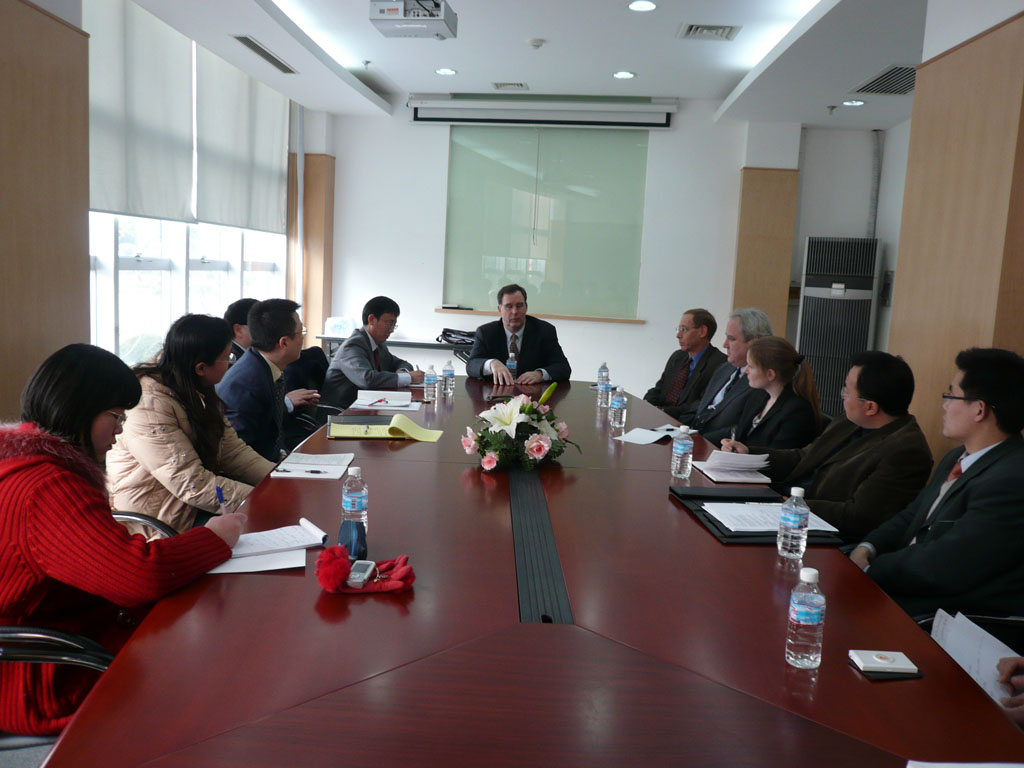
March 1, 2008: Mr. David Sedney, Deputy Assistant Secretary of Defense for Asia and Pacific Security Affairs, U. S. Department of Defense, visited the CAS with other 4 delegates.
Deputy-Director of the Center Professor Wu Xinbo chaired the Report. Professor Wu Xinbo expressed gracious welcome for the visit of Mr. David Sedney, and introduced Mr. David Sedney and his colleagues to Fudan faculty and students. Mr. David Sedney explained the Defence Telephone Link (DTL) agreement that was recently signed in Shanghai and the impacts of the act on Sino-U.S. relations.
Mr. David Sedney firstly reviewed the process how China and the U.S. set up immediate communication mechanism in order to handle crisis and emergencies, and briefly talked about on February 29, 2008, Mr. Qian Lihua, Chief of Foreign Affairs Office of China’s Defense Ministry and Mr. David Sedney, Deputy Assistant Secretary of Defense for Asia and Pacific Security Affairs, U. S. Department of Defense, signed the agreement to set up DTL between the two countries. He pointed out: “DTL will be a very useful tool in making timely contacts, clarifying issues and avoiding miscalculations.” Meanwhile, he also mentioned the whereabouts of the American soldiers missing before and after the Korean War, and that China’s Defense Ministry and the U.S. Department of Defense yesterday officially embarked on cooperation in military archives and conducting joint research on the losses during the Korean War. Next, he clarified that the purpose of setting up the DTL was to remove the worries the two countries had about each other’s military buildup, to guarantee mutual trust between the two countries in military affairs, and to promptly deal with the military misunderstanding and suspicions between the two countries. But at the same time, he emphasized that the DTL alone couldn’t solve all problems, nor could it quickly upgrade the bilateral relations. Lastly he stated that with China increasing its military presence in African regions, China would play a more and more important role in maintaining the stability and development of Africa, and this prospect required China and the U.S. to coordinate policies, strengthen cooperation, and enhance mutual trust.
After the Report, both sides had indepth discussion and communication. Concerning Professor Wu Xinbo’s question about Taiwan, Mr. David Sedney didn’t think that the U.S. minded the KMT or DPP won the election in Taiwan, as the election in Taiwan was its internal affairs. The U.S. didn’t support Taiwan joining the UN, because the U.S. observed the One-China policy. Although the U.S. had considerable clout on Taiwan, the U.S. couldn’t control Taiwan. Looking back on the relations between China mainland and Taiwan, he pointed out the relations used to have more tensions. Now the mainland and Taiwan enjoyed closer tie to each other, and the cross-strait relations had undergone dramatic changes. Professor Wu Xinbo responded that the U.S. on the one hand promised not to support Taiwan joining the UN, but on the other hand sold weapons to Taiwan, which delivered Taiwan a signal and emboldened the secessionist forces in Taiwan.
At the end of the Report, Professor Wu Xinbo made a brief summary. He thanked the wonderful report given by Mr. David Sedney, and believed the discussions today were “very constructive”.
Professor Shen Dingli, Director of the CAS, Associate Professor Xin Qiang, Deputy-Director of the CAS, Associate Professor Cai Cuihong, Doctor Song Guoyou, Doctor Wang Xiaofeng also attended the Report.



